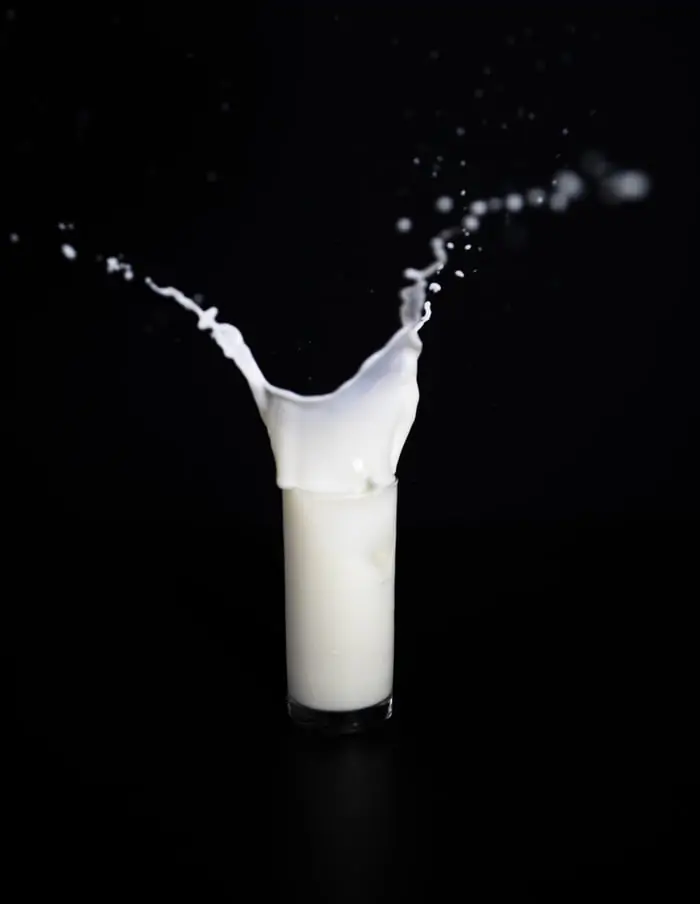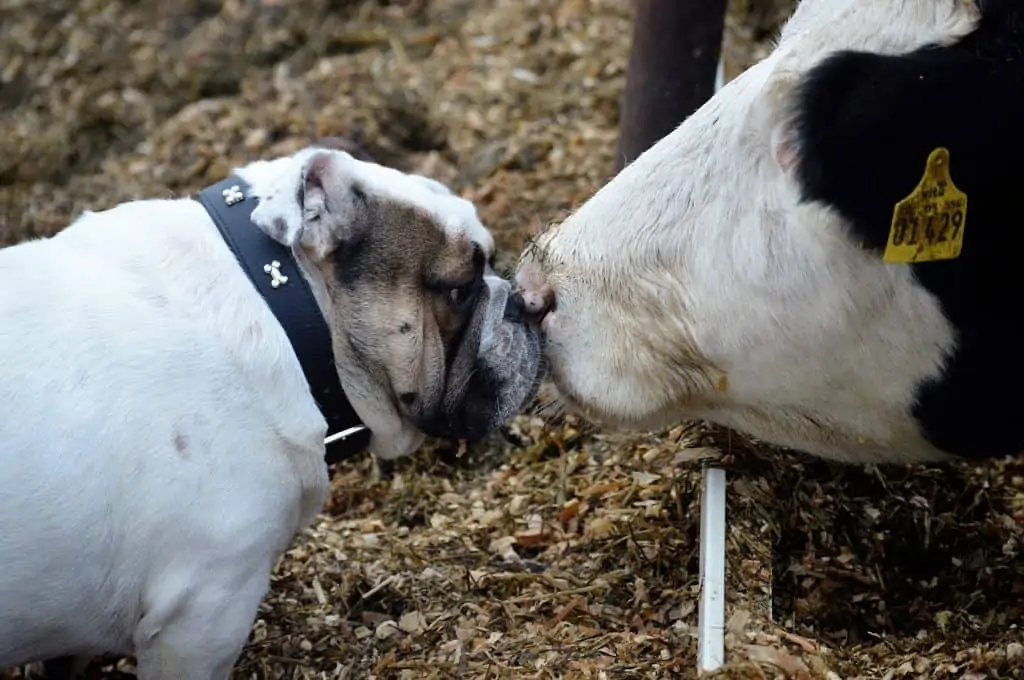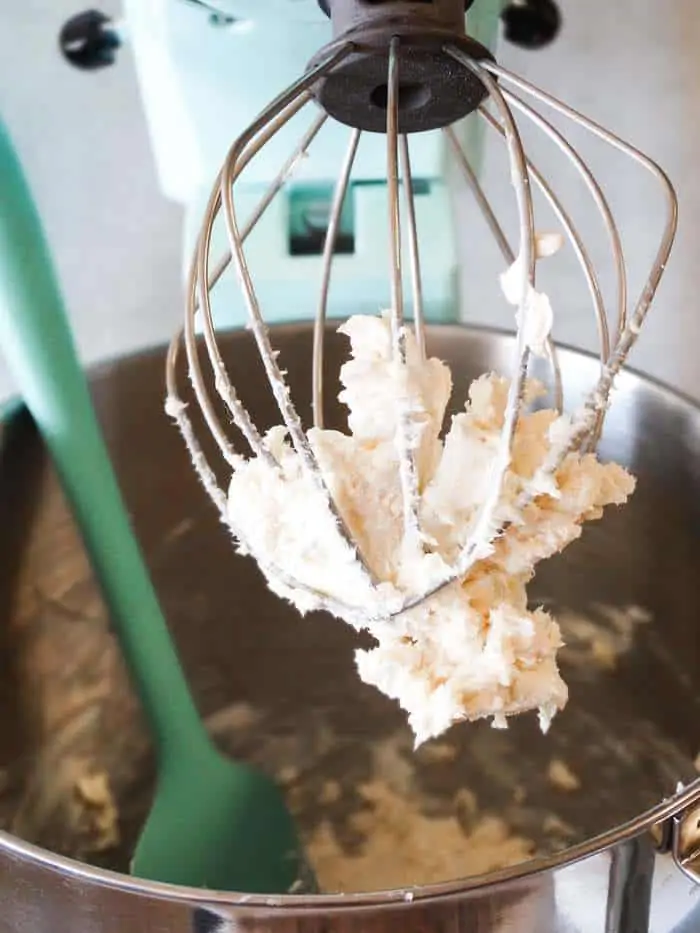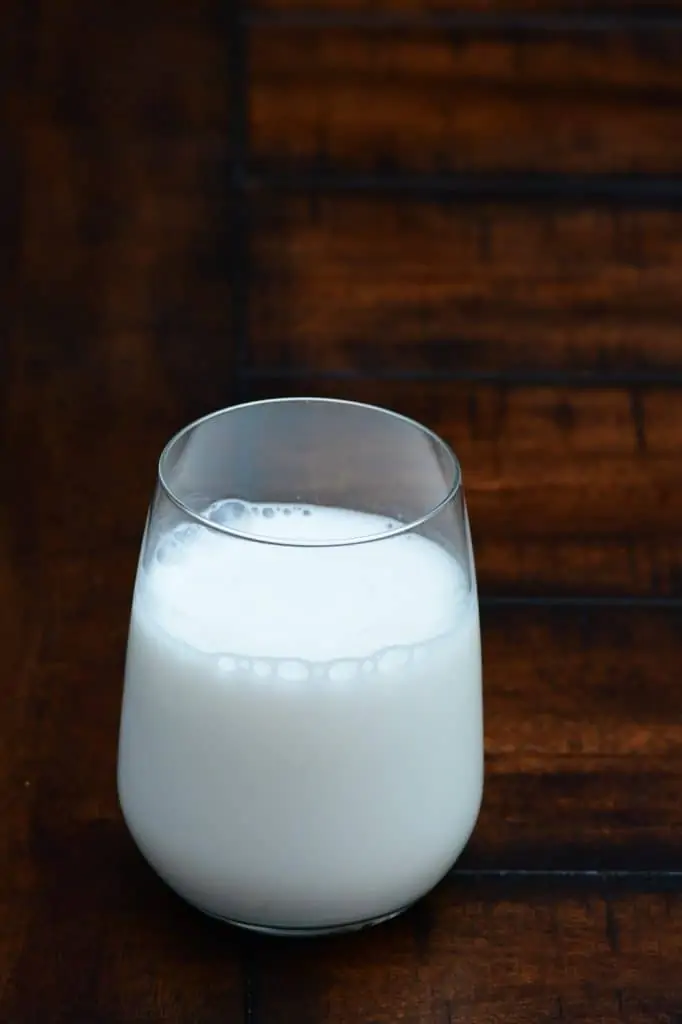Growing up, cartoons and television shows used to portray puppies and kittens sipping milk from bowls as if it was a staple part of their diet.
And while young animals do survive on their mother’s milk, giving your dog the type of milk you buy from the grocery store could prove disastrous if you’re not careful.
The good news is that milk is not harmful to dogs in small quantities, so if your dog did just enjoy a sip of milk, he should be fine.
Of course, asking can dogs have milk is more than a yes and no answer. So, join us today as we talk about sharing dairy with your dog, the dos and don’ts of can dogs have milk, and how to ensure your dog is happy and thriving with a healthy diet.
Contents
But First, Can Dogs Have Milk?
Small amounts of milk should not harm your dog, but is it a healthy treat?
Answering the question “can dogs have milk” is not as black and white as it may seem. Like people, dogs can be lactose intolerant. This basically means that a dog’s body doesn’t have the ability to properly digest milk and other dairy products and this can lead to a variety of problems including stomach ache, vomiting, gas, and diarrhea.
In fact, dogs naturally have a lower amount of lactose in their body than people do. Lactose is the enzyme needed to help properly digest milk, which means even if your dog is not lactose intolerant he will still struggle if given too much dairy in his diet.
Luckily, most dogs can tolerate small amounts of milk, and milk can even be a delightful and tasty treat for dogs in moderation.
Furthermore, milk is loaded with vitamins and nutrients that dogs need in their diet, including vitamins A, D, and B12, as well as protein and calcium.
Still, it’s important to remember that your dog can get most if not all of these essential nutrients in his daily diet with quality dog food.
Giving your dog milk in place of dog foods for these nutrients is more likely to cause larger health problems for your dogs like pancreatitis, vomiting, diarrhea, and stomach issues due to the high-fat content in milk.
Keep reading to learn more.
Can Dogs Have Milk? What You Should Know Before Giving Your Dog Dairy
Dogs can have milk, but only in very small amounts.
When asking can dogs have milk, you should also consider which types of milk and dairy products dogs cannot have. Remember, not all dairy products are safe for dogs, and just because dogs may be able to have small amounts of milk does not mean they should have other types of dairy.
Let’s talk now about what you should know when asking “can dogs have milk”.
Not All Types Of Milk Are Safe For Dogs
Dairy is classified as any product that contains milk from mammals such as cows or goats. These days, however, many people have developed other products that mimic milk for people that are lactose intolerant or otherwise don’t wish to have milk in their diet.
Alternatives to cow’s milk include popular favorites like almond milk. Almonds are not safe for dogs to ingest, and this goes for almond milk as well.
When looking to give your dogs milk, stick with dairy milk from cows or goats. You can also offer your dog small amounts of oat milk or soy milk so long as this dairy alternative does not include a sweetener known as Xylitol, which can be deadly to dogs.
All Dogs Are Somewhat Lactose Intolerant
Dogs have very different digestive systems than we humans do, and this is one of the reasons they are not equipped to digest dairy very well. As we mentioned above, dogs have a lower amount of lactose, which is the enzyme needed to help properly digest milk.
When wondering can dogs have milk, remember that while dogs can, they probably should not, or at least not very often. Their low lactose levels mean that dogs can easily struggle with digestive issues like vomiting diarrhea, pancreatitis, and other health issues when given too much milk.
Dogs who are especially sensitive to milk or are considered lactose intolerant are dogs that have an even lower amount of lactose enzymes. These dogs are especially at risk of health issues and digestive upset when given dairy.
We also suggest you stay away from dairy in any dog that has sensitivities or food allergies.
When You Do Give Your Dog Milk, Only Do So In Moderation
If you’ve found out the answer to can dogs have to milk is a yes for your particular dog, it’s still important to only give your dog milk in moderation.
But what does moderation look like when it comes to can dogs have milk?
Experts recommend sticking with only two or three tablespoons of milk at a time, and ensuring you are giving your dog low-fat milk or dairy options to reduce potential risks or digestive problems.
Allowing Your Dog To Overindulge In Milk Can Lead To Health Risks
Can dogs have milk? Yes, but remember that there are a number of health risks associated with giving your dog the wrong types of milk, flavored milk, or too much milk.
Some of the most common health issues resulting from a dog having milk include but are not limited to:
Obesity
Milk has a very high-fat content, especially when it is whole milk or cream. Overindulgence in milk or dairy can lead to weight gain in your pet, and obesity can lead to a slew of other health issues including diabetes, heart issues, and respiratory problems.
Pancreatitis
Pancreatitis is a serious and sometimes life-threatening condition that occurs when the pancreas becomes inflamed. Inflammation can happen in a dog when he eats something too fatty or greasy. Milk is on the list of foods that can lead to pancreatitis in dogs.
Symptoms of pancreatitis in your dog you should keep an eye out for when considering “can dogs have milk” include:
- Repeated Vomiting
- Weakness or Lethargy
- A Fever
- Hunched Back
- Signs of Obvious Discomfort or Pain
- A Bloated Or Hardened Abdomen
- Loss Of Appetite
- And Dehydration
If you notice these symptoms in your dog, it’s important to get your dog to a veterinarian immediately for medical attention.
Digestive Upset
The most common symptom to watch for when considering can dogs have milk is digestive upset. This could include gas, diarrhea, vomiting, discomfort, and loose stool.
While this will typically pass, digestive upset can sometimes be mistaken for pancreatitis in dogs. Be sure to pay attention to the symptoms in your dog carefully if he has had milk or dairy, and contact your veterinarian if you are not sure.
Since dogs can be so sensitive to dairy products, asking can dogs have milk should probably be changed to should dogs have milk.
While some dogs may be able to tolerate milk, most dogs shouldn’t have it. However, that doesn’t mean that all dairy products are bad for dogs.
Let’s talk now about which dairy products are safe for Fido and which dairy products you should avoid.
Can Dogs Have Milk – Which Dairy Is Safe For Dogs And Which Dairy To Avoid
Cow milk and goat milk are safe for dogs, but only in moderation.
While we know the answer to can dogs have milk is a tentative yes, remember that there are some dairy products that are not only not recommended for dogs, but even potentially harmful to dogs.
Before you offer your dog milk or dairy, it’s important to have a clear understanding of what types of milk and dairy are good for dogs and what type of milk and dairy is harmful to dogs.
Dairy That Is Safe For Dogs To Eat Or Drink
- Skim Cow Milk
- Skim cow milk can be safe for dogs in moderation. It is low in fat and still contains the calcium, vitamins, and nutrients dogs can benefit from. Still, even skim milk should be given in moderation.
- 2% Cow Milk
-
- Like skim milk, 2% milk is also safe for dogs in moderation or in very small amounts. However, remember that it is higher in fat content than skim milk, so it should only be offered in a few teaspoons.
- Goat Milk
-
- Goat milk is also safe milk for dogs to consume in small quantities. However, it’s important to note that goat milk still contains lactose and it can be harmful to dogs who have lactose intolerance or sensitivities.
- Oat Milk
-
- Oat milk is dairy-free and lactose-free. It is also made with oats, which are known to be safe for dogs to consume. If you are looking for a safe treat to share with your dog that is milk-like as far as consistency without the lactose that can cause digestive issues for your pup. Be sure to read the ingredients and avoid oat milk that is flavored or sweetened with sugars or Xylitol.
- Soy Milk
-
- Soy milk can also be safe in small quantities for your dog, though it’s very important to avoid milk that is sweetened with sweeteners or sugars, especially the artificial sweetner Xylitol.
- Mozzarella, Cheddar, Cottage Cheese or Goat Cheese
-
- The above-listed cheeses are safe for dogs to eat in moderation due to their low fat content and the nutrients they contain like calcium. However, it’s very important not to let your dog overindulge. Remember, when asking can dogs have milk or dairy, the answer is always going to be only in moderation.
- Plain Yogurt
-
- Plain yogurt or plain greek yogurt can be safe for dogs and even beneficial for young puppies struggling with dietary issues. Plain yogurt contains a number of vitamins and minerals as well as probiotics that can help aid in digestion.
Dairy To Avoid
- Whole Milk
-
- Small amounts of whole milk should be fine for your dog, but it’s generally not recommended when asking can dogs have milk. Whole milk has a very high-fat content and your dog has more of a chance of developing serious health issues like pancreatitis and digestive upset when given whole milk, even in moderation.
- Chocolate Milk or Flavored Milk
-
- Most of us already know that dogs should not have chocolate, and the same is true for chocolate milk. We also don’t recommend allowing your dog to have other flavored or sweetened milk, as these milk are high in sugar content, fat content, and could even contain artificial sweeteners or additives like Xylitol that can be toxic to your dog.
- Almond Milk
-
- Almonds are generally not recommended for dogs because they are high in fat and can increase your dog’s chances of developing pancreatitis. For this reason, we recommend steering clear of giving your dog almond milk when asking can dogs have milk.
- Vanilla Ice Cream
-
- Though some say that a small amount of vanilla ice cream is fine for dogs, most experts advise against it. Vanilla ice cream is high in sugar and fat, and again this can cause serious issues for your dogs like digestive upset and pancreatitis.
- Blue Cheese
-
- While there are some cheeses that are safe for dogs that you can consider when asking can dog have milk and dairy, there are some types of cheese that can be dangerous. One such cheese is blue cheese, which is made with a fungus that produces a substance known as oquefortine C. Oquefortine C can cause serious health issues in your dog including vomiting, diarrhea, high fever, and even seizures.
- Cream And Butter
-
- Both cream and butter have very high-fat contents, and again this can lead to serious issues in your dog, especially issues like pancreatitis. For this reason, when asking can dogs have milk and dairy, it’s best to avoid giving these two dairy products to your pup.
A Few Dairy Products That Are Safe For Dogs In Moderation
Dogs can also enjoy cheese and plain yogurt from time to time.
While there are a number of dairy products and milk products that can be harmful to your dog, there are other products that can be safe and even beneficial. In fact, many companies have worked to create dog-safe treats that are made with cheese, yogurt, and other dairy ingredients that dogs can enjoy safely.
So, can dogs have milk? Maybe it’s not the best idea to give your dog milk alone, but Fido can certainly indulge in some of these tasty dairy treats made specifically for dogs that we’ve listed below.
Tricky Trainers Dog Treats With Chedder
No products found.
Dogs do love cheese, and there are some dog treats that are made specifically for dogs that contain a tasty cheesy taste your dog will love. The best part about these treats is that they are specifically made for doggy consumption, so they are safe for your dog to eat.
The above treats come in a five-ounce package, though they can be ordered in a 14-ounce package for multi-dog households.
The treats are made with quality ingredients and are free of fillers, additives, artificial ingredients, and other additives your dog doesn’t need. They are also made with whole grain and real cheddar.
Stewart Freeze Dried Cheddar Cheese Dog Treats
No products found.
What is more simple than 100% real cheese for your dog? While we know you came here asking can dogs have milk, we know that milk can be bad for some dogs. However, certain types of cheese are often safe in moderation, so we recommend the above freeze-dried cheese treats above by the Stewart store.
These cheesy treats are made with one simple ingredient – 100% real cheddar cheese! They are safe for dogs to eat in moderation and come in an easy-to-store sealable tub to help keep the treats fresh.
Healthy Spot Stack That Chedder Cheese Treat
No products found.
Another cheese treat we like as an alternative to can dogs have to milk are these treats by the Healthy Spot store. These cheddar treats are made of real cheddar cheese and nothing else.
They are safe for all dog breeds and ages and are even flash-frozen to preserve nutrients and enhance the cheesy flavor.
These treats are also full of vitamins and minerals, so they can even be good for your dog in moderation. This is an all-natural dairy treat you can feel good and safe about sharing with your pup.
Fruitables Greek Yogurt Dog Treats
No products found.
Plain yogurt is another safe dairy treat you can offer your dog, which is why we like the Fruitables Greek Yogurt Dog Treats above by the Fruitables Store.
These dog treats come in several flavors including vanilla with pumpkin, strawberry, and coconut.
The treats are made with real Greek yogurt and are oven-baked so they are nice and crunchy. We love that these treats are natural in vitamins, antioxidants, and fiber, and can even help support a healthy digestive system.
These dog treats make excellent training treats, though we wouldn’t recommend them to dogs with sensitivities or dogs who have issues with digesting dairy or are otherwise lactose intolerant.
Hoggin Dogs Ice Cream Sample Pack
No products found.
With a clever name like Hoggin Dogs, it’s no surprise that the above doggy ice cream mixtures are safe for dogs and even make a tasty treat for summer or warm weather! All you need to do to make this safe dog ice cream is add water to these mixtures and then freeze them.
The above order comes with several flavors you can offer your dog including milk, banana, and cheese.
The mix is made with healthy ingredients that are made for canine conusmption. Of course, remember that these treats should still be given to your dog in moderation to reduce potential digestive issues or weight gain.
Like humans, dogs can suffer from lactose intolerance.
The answer to can dogs have milk might be a yes for some dogs, but other dogs could be more sensitive and have a lower amount of lactose enyzmes needed to digest even safe dairy products.
If you know your dog has sensitivities or is lactose intolerant, there are lactose-free treats that can mimic milk or ice cream that your dog can indulge in.
We have listed a few of our favorites below for you to consider.
Wholesome Pride Banana Bites For Dogs
No products found.
If the answer to can dogs have milk is a no for you, you might want to try offering your dog some banana treats. Bananas have a sweet taste and creamy consistency that can mimic milk, and many dogs enjoy the dried banana bites above by the Wholesome Pride Store.
These treats are available in an 8-ounce package and contain limited ingredients made with real bananas and coconut oil.
They are natural, healthy, and safe for your dog, and they are also free of grains, fillers, additives, or preservatives. On their own, bananas are low in cholesterol and sodium. They are also rich in vitamins and nutrients like potassium, fiber, copper, and biotin.
However, bananas are also high in sugar, so even dog treats like these should be given in moderation only.
Pupsiclez Dog Treats
No products found.
Not all ice cream for dogs has to contain dairy! So, when asking can dogs have milk and especially when wondering which kinds of milk you can give your dog for a treat, why not consider Pooch Ice Pops by Pupsicles?
These ice pops are frozen treats you can purchase and store in your freezer for your dog, offering them to him on a warm summer day. Pupsicles can also help aid discomfort in teething puppies or help keep bored adult dogs busy and mentally stimulated.
These treats are made with different flavors including banana, pumpkin, and mint. The ingredients are all human-grade and the recipe was put together by a vet and a nutritionist, which we love.
Making Your Own Milky Treats For Fido – Tips and Tricks
It’s easy and fun to make your own dog treats at home!
While you can purchase doggy ice cream and cheesy treats for your dog at your local pet supply store or online, it’s also possible to make your own tasty dog treats at home.
While we don’t recommend dogs indulge in dairy alone, there are times you can add small quantities of dairy to a dog-safe recipe for a yummy treat.
There are also recipes that can mimic dairy. So, if the answer to can dogs have milk is a no for your particular dog, don’t worry. We have him covered with our dog-approved recipe below.
Take a look!
How To Make Frozen Ice Cream Paw Bites For Your Dog
Ingredients:
- 16 Ounces Of Plain Yogurt
- 3/4ths Cup Dog-Safe Peanut Butter
- 1 Ripe Banana
- A Blender or Food Processor
- Silicone Paw Molds (Optional)
Directions:
Add all the above ingredients to a blender or food processor and mix until the consistency is creamy. Then scoop the mixture into a bowl or into your ice cube tray or silicone paw molds.
Place the treats into your freezer and allow them to harden for two to three hours. Then give them to your dog as tasty treats! Remember, because these treats contain peanut butter and yogurt, they should be given to your dog in moderation only.
Puppy Dog Silicone Molds
No products found.
These silicone dog paw and bone molds are an adorable addition to any freezer. If you’re making dog treats as gifts for friends’ dogs, they will love these adorable shapes! You can also use these molds for regular ice, or fun jello treats for your kids or family.
So, Can Dogs Have Milk? Let’s Sum It Up!
Dogs can have milk in moderation, but it’s not the ideal treat for them all the time.
Asking “can dogs have milk” is a complicated question and is proceeded by a number of complicated answers. Since there is no real yes or no answer when it comes to can dogs have milk, the easiest way to go about deciding if your dog can have milk or dairy is to do a process of elimination.
First, ask yourself if your dog has sensitivities or allergies to certain foods. If the answer is yes, then the answer to can dogs have milk in your case should automatically be no. Dogs with allergies or sensitives can be much more likely to suffer from aversive side effects related to drinking milk or eating dairy.
Also remember that not all dairy is safe for dogs, even if the answer to “can dogs have milk” for your particular dog is a yes, it’s still wise to proceed with caution.
So, what is our opinion on can dogs have milk?
Knowing that there are so many other healthy treat alternatives to dairy products for dogs, we would recommend staying away from dairy milk for dogs.
Instead, stick with treats you know dogs can safely consume. Chances are your dog would prefer meat treats, carrots, or other types of dog-safe and healthy snacks to milk anyway.
We hope this has been a helpful guide to dairy for dogs and we hope we have answered your question about “can dogs have milk”.
Now we want to hear from you. What do you think about giving your dog dairy in moderation? Leave us your thoughts in the comment section below.
Thanks for reading!

Jen Jones is a professional dog trainer and behavior specialist with more than 25 years of experience. As the founder of ‘Your Dog Advisor’ and the ‘Canine Connection’ rehabilitation center, she applies a holistic, empathetic approach, aiming to address root causes rather than merely treating symptoms.
Well known for her intuitive and compassionate approach, Jen adopts scientifically-proven, reward-based methods, encouraging positive reinforcement over punishment. Jen specializes in obedience training, behavior modification, and puppy socialization. Her innovative methods, particularly in addressing anxiety and aggression issues, have been widely recognized. Jen has worked with many of the world’s leading dog behaviorists and in her free time volunteers with local animal shelters and rescue groups.







